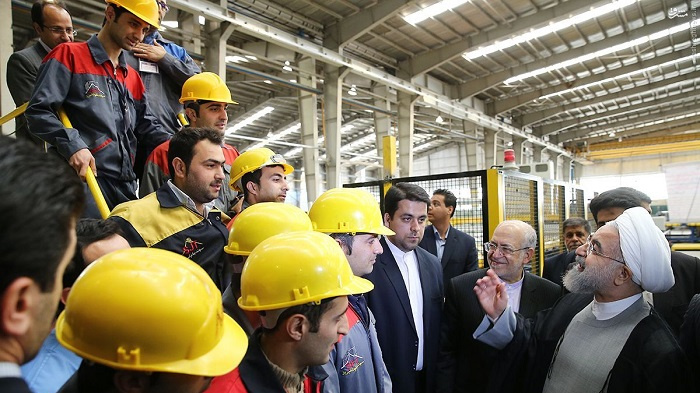Has Rouhani’s support base shrank before the upcoming presidential election?

(Hassan Rouhani visiting a factory in Eastern Azerbaijan Province. Source: president.ir)
In less than ten days, the registration window opens for hopefuls who wish to run in the twelfth presidential race. Apart from speculations about the candidates and tactics likely to be used by political parties, an important issue worth investigating is President Rouhani’s base of support in the upcoming election.
Hassan Rouhani spends his last months in Tehran’s Pasteur Street palace, as Iran’s eleventh president, while he is working on a reelection in the presidential race slated for May 19. It is however quite complicated and very different from 2013. Rouhani’s track record of four years in office could heavily affect his base how. This puts forward the question whether Rouhani could once again magnetize the public to the ballot boxes or not.
Swing votes
In 2013, it was almost 72 hours before voting in the eleventh presidential race that ‘floater’ voters chose to back and write in Rouhani. By definition, this group’s participation in any election remains to be decided. They have not decided to support Rouhani yet. Obviously, however, their failure to do so could be a serious threat to Rouhani’s base. If he fails to elicit their support and trust, his votes will plummet.
Supporting then, unhappy now
Dissatisfaction of supporters is another issue elected politicians have to deal with. Hassan Rouhani is no exception. In 2013, apart from endorsement from the late Ayatollah Hashemi Rafsanajni and former president Mohammad Khatami, Rouhani attracted many votes by promises he made on various issues of foreign, domestic, economic, and cultural policies. However, he has failed to realize all his vows, resulting in the dissatisfaction of a remarkable part of his base.
Views on this differ widely in the two major camps. The Reformists are on the belief that Rouhani may have succeeded to score many achievements in foreign policy, including the nuclear deal, but has not achieved much in domestic policy. That explains why influential Reformist politician Hossein Marashi said in an interview that the camp endorses Rouhani’s general policies but not all everything the administration did in domestic policy. “We have been and remain critical of the Interior Ministry,” media outlets have quoted Marashi as saying.
This was not the only criticism coming from the Reformist camp. “I fail the administration in the course and decline to give it a pass. The Rouhani administration did nothing regarding house arrest [of Mirhossein Mousavi and Mehdi Karroubi, leaders of the Green Movement]. It has not done anything regarding freedom of expression, freedom of the press, and release of political prisoners yet. In fact, the administration has done nothing regarding citizenship rights and civil freedoms, except for some slogans in the form of the Citizen Rights Charter,” says pro-Reform expert Sadegh Zaibakalam.
Advocates of the administration, whether Principlist or Reformist, agree on one thing: the administration’s economic achievements. Despite differences over quantity, they agree that the administration has failed to tangibly improve people’s daily lives, while stagnation and unemployment rates have deteriorated.
Dissatisfaction among part of the people should be added to the list because certain groups, who voted in favor of Rouhani in 2013, have lost interest to vote for him again in a bid to avoid a reelection due to economic hardship.
Therefore, it will be one of the challenges ahead of Rouhani to align these critics and dissatisfied used-to-be supporters. Even though political groups and activists may be ready to back Rouhani for another term, inducing satisfaction in public opinions will be the greatest challenge of all.
Hardliner artillery and its impact
Attack by hardliners may also affect President Rouhani’s base of supporters. Pro-reform Tehran University professor Hamidreza Jalaeipour finds it a difficult task for Rouhani to collect enough votes as his hardliner opponents have made a great network of media outlets to put the blame for economic problems on Rouhani. Referring to a poll in which Rouhani did not do well, Jalaeipour said it would be difficult to mobilize the weaker strata to vote for Rouhani. “The good thing about the poll is that at least 60 percent of the people in Tehran would turn out in the election. However, Rouhani only won 27 percent of the votes. In the downtown and marginal districts, where middle and lower classes dominate, Rouhani did not do well. His status is good in major districts. Of course, 40 percent of the people have not decided who to vote for yet,” he explained.
Infiltrators
Rouhani’s track record and hardliners’ attacks are not the only issues that could affect because some analyst believe that middle-rank officials in the government could also prove jeopardous for Rouhani. On the threshold of the election, Rouhani should sort out senior and middle managers who may very well shift affiliations. This is one of the issues pinpointed by administration supporters again and again, as such managers have already contributed to anti-administration propaganda in different cities.
It is difficult to predict the election but obvious that these threats could stir Hassan Rouhani’s base of supporters in his bid to reelection. He may have a 96 percent popularity based on a recent poll conducted by University of Maryland, but will definitely face many problems in the days leading to the election, challenging his experience and skill in politics.

